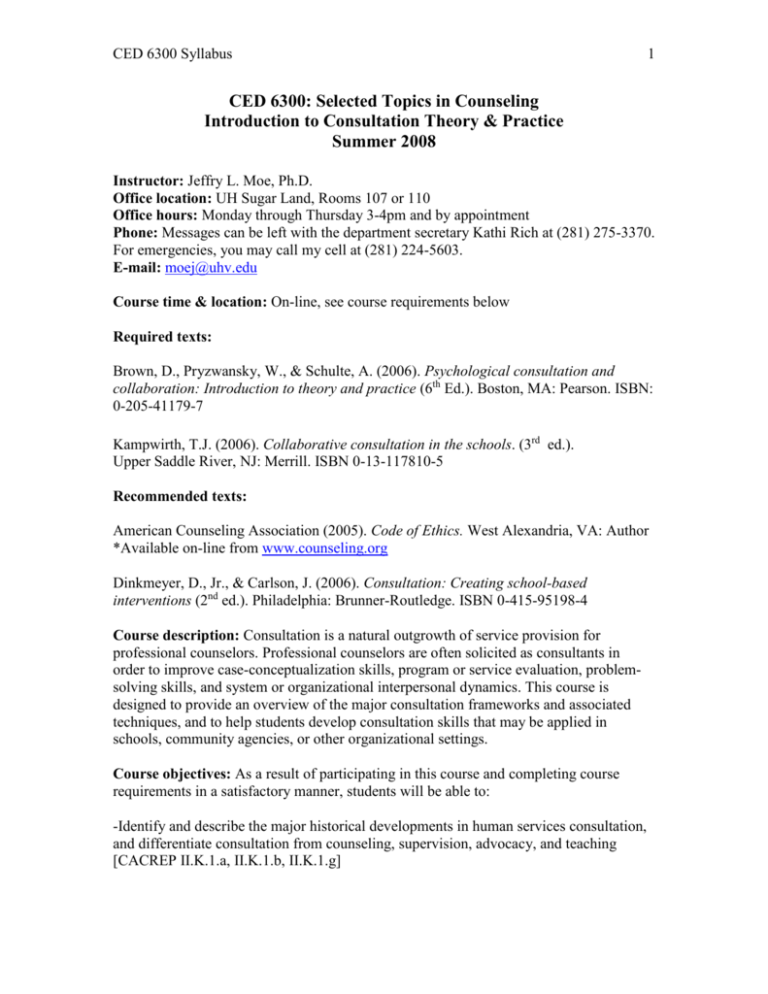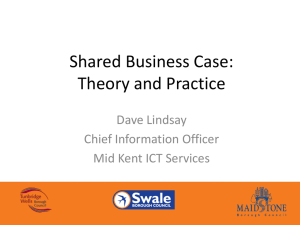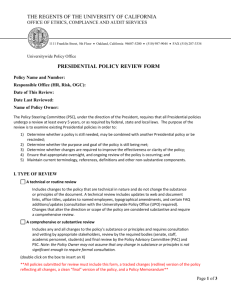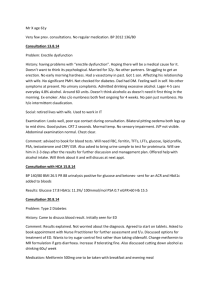Introduction to Consultation Theory & Practice
advertisement

CED 6300 Syllabus 1 CED 6300: Selected Topics in Counseling Introduction to Consultation Theory & Practice Summer 2008 Instructor: Jeffry L. Moe, Ph.D. Office location: UH Sugar Land, Rooms 107 or 110 Office hours: Monday through Thursday 3-4pm and by appointment Phone: Messages can be left with the department secretary Kathi Rich at (281) 275-3370. For emergencies, you may call my cell at (281) 224-5603. E-mail: moej@uhv.edu Course time & location: On-line, see course requirements below Required texts: Brown, D., Pryzwansky, W., & Schulte, A. (2006). Psychological consultation and collaboration: Introduction to theory and practice (6th Ed.). Boston, MA: Pearson. ISBN: 0-205-41179-7 Kampwirth, T.J. (2006). Collaborative consultation in the schools. (3rd ed.). Upper Saddle River, NJ: Merrill. ISBN 0-13-117810-5 Recommended texts: American Counseling Association (2005). Code of Ethics. West Alexandria, VA: Author *Available on-line from www.counseling.org Dinkmeyer, D., Jr., & Carlson, J. (2006). Consultation: Creating school-based interventions (2nd ed.). Philadelphia: Brunner-Routledge. ISBN 0-415-95198-4 Course description: Consultation is a natural outgrowth of service provision for professional counselors. Professional counselors are often solicited as consultants in order to improve case-conceptualization skills, program or service evaluation, problemsolving skills, and system or organizational interpersonal dynamics. This course is designed to provide an overview of the major consultation frameworks and associated techniques, and to help students develop consultation skills that may be applied in schools, community agencies, or other organizational settings. Course objectives: As a result of participating in this course and completing course requirements in a satisfactory manner, students will be able to: -Identify and describe the major historical developments in human services consultation, and differentiate consultation from counseling, supervision, advocacy, and teaching [CACREP II.K.1.a, II.K.1.b, II.K.1.g] CED 6300 Syllabus 2 -Identify and describe the major theoretical frameworks and associated techniques of consultation, including Mental Health/Triadic Consultation, Systems-level consultation, and Collaborative Behavioral Consultation [CACREP II.K.3.b., II.K.3.c, II.K.3.d, II.K.5.d, II.K.5.e] -Identify and describe the stages of consultation processes and methods for collaboration with a variety of consultee types (parents, teachers, other mental health professionals, etc.) [CACREP II.K.1.b, II.K.3.d, II.K.5.a, II.K.5.d, II.K.5.e] -Identify, describe, and demonstrate characteristics of effective consultants [CACREP II.K.1.b, II.K.5.a, II.K.5.e] -Identify and describe the role that multicultural and diversity issues play in consultation, including appropriate and effective methods of social justice advocacy [CACREP II.K.2.c, II.K.2.d] -Identify, describe, and select appropriate and effective methods of data collection and service evaluation within a consultation framework [CACREP II.K.5.a, II.K.5.e, II.K.8.d, II.K.8.e] -Identify, describe, and apply ethical, legal, and professional issues related to the provision of consultation services [CACREP II.K.1.h, CACREP II.K.3.e, CACREP II.K.5.g, CACREP II.K.8.f] Course requirements: 1. Learning Objectives: Students must submit responses to the learning objectives for each unit by the due dates listed below. Responses to each objective should not be more than 2 double-spaced pages in length. Learning Objective responses are worth 80 points (10 points for complete responses to each Unit). 2. Discussion Board: For units One through Eight, students must post one question and respond to at least one question from another student on the main discussion board located on the WebCT for the class. Participation in the discussion boards is worth 20 points 3. Consultation Proposal: Students will submit a proposal for a consultation that they could perform in an organization that they have worked for or with (including current places of employment). Your consultation proposal is worth 50 points. The proposal must include: a. A rationale for your consultation effort, including a description of the problem or issue you will address. Identify the consultee and the identified client(s). 5 points b. A description of the model of consultation you will use as a guiding framework (i.e., Mental Health, Behavioral, Systems-Level, etc.). 5 points c. A plan for how you will gain access to the consultee and establish a consulting relationship (joining). 5 points CED 6300 Syllabus 3 d. Your assessment and/or diagnoses plan for clarifying the problem or issue. 5 points e. Operational definition of the problem(s). 4 points f. Stated goals that are observable and measurable. 4 points g. Intervention strategies and descriptions for how they will be implemented. *Cite sources for your interventions. 5 points h. Describe how you will evaluate the success of your consultation. 4 points i. Describe how you will terminate and follow up. Identify any pertinent ethical issues that could affect your consultation. 5 points j. Include references in APA style. 3 points k. Include a one-page contract for your consultation. 5 points Total points possible for class assignments: 150 points Grading Scale: 92-100% 82-91% 70-81% A B C 60-69% 59% or below D F Class policies: On-line technical support: For technical support and all issues related to WebCT, students may contact Mr. Lawrence Nelson (361) 570-4253, edutechhelp@uhv.edu. Plagiarism Any student who represents the written work of another person as his or her own for an assignment will receive a grade of zero (0) for said assignment and may face disciplinary action through the University. Attendance/Participation: Students are expected to complete and submit all assignments by the due dates outlined in the course schedule. As per University policy, exigent and dire circumstances may excuse students from adhering to the posted due dates for assignments. Should such exigent and dire circumstances arise, students must contact me (Dr. Moe) or leave word with Ms. Kathi Rich (department secretary) at the contact information provided above. Extra credit: Students are afforded sufficient credit opportunities by fulfilling class requirements. Barring exigent and dire circumstances, extra credit will not be accepted or approved. Incompletes: Incompletes will only be given under extreme circumstance. An incomplete represents that a student was able to complete almost all of the course requirements, but was not able to finish the remaining requirements due to exigent circumstances. In accordance with University policy, all incompletes must be completed in the semester following the one in which they are received. If this is not done, the grade reverts to Failure. CED 6300 Syllabus 4 Professionalism and Diversity: Acting within the bounds of professionalism and the student code of conduct is required. Encountering new ideas, new ways of knowing, and interacting with people different from ourselves are pillars of the college and professional training experience. Intimidating (e.g., Racist, sexist, anti-Semitic, homophobic, etc.,) language will be challenged in this classroom. Students will be encouraged and expected to be mindful of this and other diversity related issues. Accommodations: Students requiring personalized arrangements for test taking, classroom access, or other accessibility concerns should notify the Office of Student Relations so that the University may provide appropriate support services to facilitate your learning. Additional information is provided in the Student Handbook. Electronic devices: Ringing and beeping devices are expected to be set on vibrate or non-audio during class time in order to reduce disruption. Course changes: I reserve the right to modify assignment structure, re-arrange topic discussion, and to make as needed changes to the course. Outline of Units Unit Two (LO’s Due June 16th) Course Overview; History and development of human services consultation; Adlerian-based consultation (Brown, Pryzwansky, & Schulte Ch. 1, 4; Kampwirth Ch. 1) General Consultation Processes & Evidence-based Practice (Brown, Pryzwansky, & Schulte Chs. 6, 11; Kampwirth Ch. 5) Unit Three (LO’s Due June 23rd) Characteristics of Effective Consultants (Brown, Pryzwansky, & Schulte Chs. 7, 8; Kampwirth Ch. 3) Unit Four (LO’s Due June 30th) Ethical, Legal, & Professional Issues (ACA Code of Ethics; Brown, Pryzwansky, & Schulte, Chs. 12, 13; Kampwirth Ch. 4) Unit Five (LO’s Due July 8th) Unit Six (LO’s Due July 14th) Advocacy & Multicultural Competence in Consultation (ACA Advocacy Competencies, Multicultural Counseling Competencies; Brown, Pryzwansky, & Schulte, Chs. 1, 13; Kampwirth Ch. 4;) Triadic Mental Health Consultation (Brown, Pryzwansky, & Schulte Chs. 2; Kampwirth Ch. 2) Unit Seven (LO’s Due July 21st) Behavioral Consultation (Brown, Pryzwansky, & Schulte, 3; Kampwirth Ch. 6, Case Study #1 in Kampwirth Ch. 9) Unit Eight (LO’s Due July 28th) Systems-level Consultation (Brown, Pryzwansky, & Schulte, 5; Kampwirth Ch. 8, Case Study #2 in Kampwirth Ch. 9) Unit Nine (Final Project Due August 4th) Consultation With Parents & Schools (Brown, Pryzwansky, & Schulte, Chs. 9, 10; Kampwirth Ch. 7) Unit One (LO’s Due June 9th)





